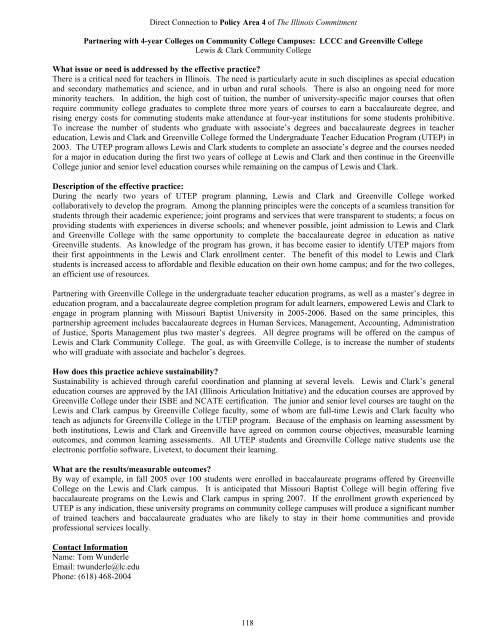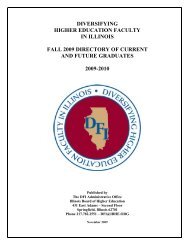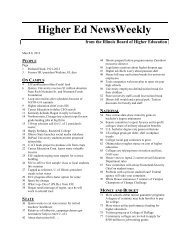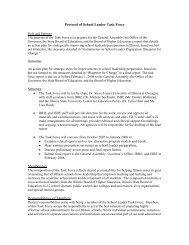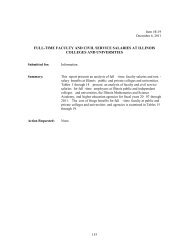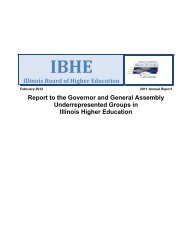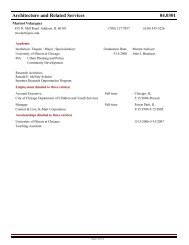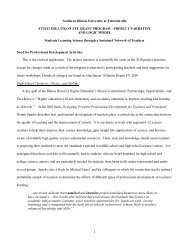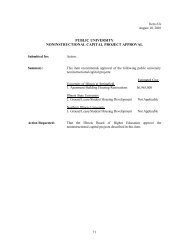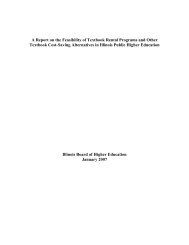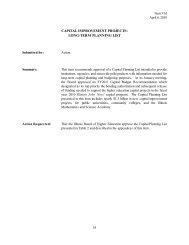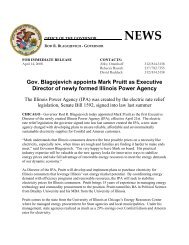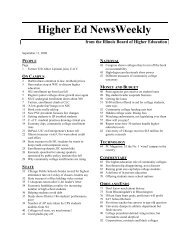Title of Effective Practice: - California Postsecondary Education ...
Title of Effective Practice: - California Postsecondary Education ...
Title of Effective Practice: - California Postsecondary Education ...
You also want an ePaper? Increase the reach of your titles
YUMPU automatically turns print PDFs into web optimized ePapers that Google loves.
Direct Connection to Policy Area 4 <strong>of</strong> The Illinois Commitment<br />
Partnering with 4-year Colleges on Community College Campuses: LCCC and Greenville College<br />
Lewis & Clark Community College<br />
What issue or need is addressed by the effective practice?<br />
There is a critical need for teachers in Illinois. The need is particularly acute in such disciplines as special education<br />
and secondary mathematics and science, and in urban and rural schools. There is also an ongoing need for more<br />
minority teachers. In addition, the high cost <strong>of</strong> tuition, the number <strong>of</strong> university-specific major courses that <strong>of</strong>ten<br />
require community college graduates to complete three more years <strong>of</strong> courses to earn a baccalaureate degree, and<br />
rising energy costs for commuting students make attendance at four-year institutions for some students prohibitive.<br />
To increase the number <strong>of</strong> students who graduate with associate’s degrees and baccalaureate degrees in teacher<br />
education, Lewis and Clark and Greenville College formed the Undergraduate Teacher <strong>Education</strong> Program (UTEP) in<br />
2003. The UTEP program allows Lewis and Clark students to complete an associate’s degree and the courses needed<br />
for a major in education during the first two years <strong>of</strong> college at Lewis and Clark and then continue in the Greenville<br />
College junior and senior level education courses while remaining on the campus <strong>of</strong> Lewis and Clark.<br />
Description <strong>of</strong> the effective practice:<br />
During the nearly two years <strong>of</strong> UTEP program planning, Lewis and Clark and Greenville College worked<br />
collaboratively to develop the program. Among the planning principles were the concepts <strong>of</strong> a seamless transition for<br />
students through their academic experience; joint programs and services that were transparent to students; a focus on<br />
providing students with experiences in diverse schools; and whenever possible, joint admission to Lewis and Clark<br />
and Greenville College with the same opportunity to complete the baccalaureate degree in education as native<br />
Greenville students. As knowledge <strong>of</strong> the program has grown, it has become easier to identify UTEP majors from<br />
their first appointments in the Lewis and Clark enrollment center. The benefit <strong>of</strong> this model to Lewis and Clark<br />
students is increased access to affordable and flexible education on their own home campus; and for the two colleges,<br />
an efficient use <strong>of</strong> resources.<br />
Partnering with Greenville College in the undergraduate teacher education programs, as well as a master’s degree in<br />
education program, and a baccalaureate degree completion program for adult learners, empowered Lewis and Clark to<br />
engage in program planning with Missouri Baptist University in 2005-2006. Based on the same principles, this<br />
partnership agreement includes baccalaureate degrees in Human Services, Management, Accounting, Administration<br />
<strong>of</strong> Justice, Sports Management plus two master’s degrees. All degree programs will be <strong>of</strong>fered on the campus <strong>of</strong><br />
Lewis and Clark Community College. The goal, as with Greenville College, is to increase the number <strong>of</strong> students<br />
who will graduate with associate and bachelor’s degrees.<br />
How does this practice achieve sustainability?<br />
Sustainability is achieved through careful coordination and planning at several levels. Lewis and Clark’s general<br />
education courses are approved by the IAI (Illinois Articulation Initiative) and the education courses are approved by<br />
Greenville College under their ISBE and NCATE certification. The junior and senior level courses are taught on the<br />
Lewis and Clark campus by Greenville College faculty, some <strong>of</strong> whom are full-time Lewis and Clark faculty who<br />
teach as adjuncts for Greenville College in the UTEP program. Because <strong>of</strong> the emphasis on learning assessment by<br />
both institutions, Lewis and Clark and Greenville have agreed on common course objectives, measurable learning<br />
outcomes, and common learning assessments. All UTEP students and Greenville College native students use the<br />
electronic portfolio s<strong>of</strong>tware, Livetext, to document their learning.<br />
What are the results/measurable outcomes?<br />
By way <strong>of</strong> example, in fall 2005 over 100 students were enrolled in baccalaureate programs <strong>of</strong>fered by Greenville<br />
College on the Lewis and Clark campus. It is anticipated that Missouri Baptist College will begin <strong>of</strong>fering five<br />
baccalaureate programs on the Lewis and Clark campus in spring 2007. If the enrollment growth experienced by<br />
UTEP is any indication, these university programs on community college campuses will produce a significant number<br />
<strong>of</strong> trained teachers and baccalaureate graduates who are likely to stay in their home communities and provide<br />
pr<strong>of</strong>essional services locally.<br />
Contact Information<br />
Name: Tom Wunderle<br />
Email: twunderle@lc.edu<br />
Phone: (618) 468-2004<br />
118


